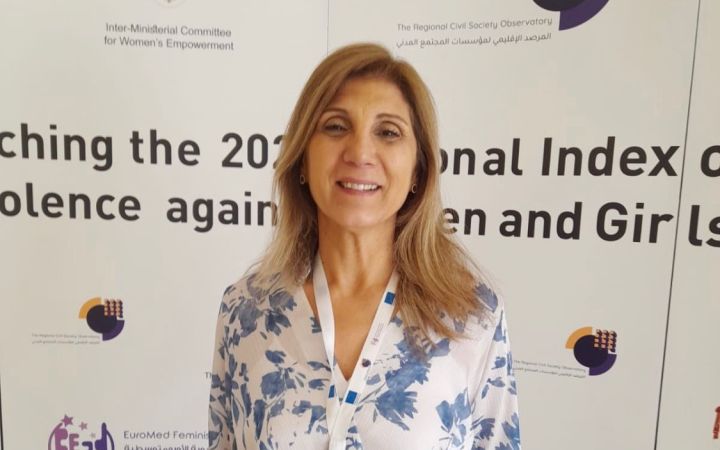- Joumana El Halabi is a gender focal point at the Lebanese Ministry of Education and Higher Education.
- Since 2013, Joumana is working with local and international partners to raise awareness on gender equality and women’s empowerment.
- The COVID-19 pandemic, refugee influx and economic crisis are challenging gender equality and women’s empowerment in Lebanon.
- Joumana learned how to integrate gender in action plans, monitoring & evaluation, and strategy through the UNITAR Division for Prosperity online training programme on gender equality and women’s empowerment in Jordan and Lebanon.
September 2022, Hiroshima, Japan – Joumana El Halabi has been working to promote gender equality and women’s empowerment since 2013. She believes that advancing gender equality and women’s empowerment in Lebanon is hampered by cultural, social and economic values, limited resources and the lack interest among policymakers. Matters have become even more difficult in recent years as the country grapples with an acute economic crisis, significant influx of Syrian refuges (1.5 million people according to UNHCR), the COVID-19 pandemic and political instability.
Policymakers have other priorities than issues of woman. And this is an obstacle we’re having today and whenever we want to do something special for women.
Despite the enormous challenges, there are still opportunities to leverage. Lebanon is a signatory to conventions promoting gender equality and women’s empowerment, including the Convention on the Elimination of all Forms of Discrimination against Women. The Lebanese Constitution guarantees equality to all citizens, and the country has some national laws to protect women’s rights, especially labour rights, and more are being considered. The female student population in Lebanon shows great potential; they tend to outperform their male counterparts in most national competitions.
Report card of Ministry of Education & Higher Education
Joumana knows there is still much work to be done but notes some progress has been made. Her ministry, the Ministry of Education and Higher Education, is training teachers to call out stereotypical gender ideas in current curriculums and books. Some textbooks have been updated, but even when using those that were not, teachers learn how to reflect with their students on negative ideas that go against gender equality and women’s empowerment. The Ministry is also recruiting more psychiatrists to help them assess the situation and condition of the students and support its activities. They are also advancing several United Nations Sustainable Development Goals.
Improved coordination among the government ministries is leading to better outcomes. Through the Ministry, the Gender Committee works with the National Commission for Lebanese Women (NCLW) and other NGOs to address sexual harassment, human trafficking, workplace issues and domestic violence. The Ministry has also partnered with the World Bank and UNICEF, USAID and embassies in Lebanon.
Joumana is already witnessing some positive changes from their work: cultural norms and attitudes are evolving, especially among students.
Learning with UNITAR
Joumana wanted to learn more about gender equality and women’s empowerment, she was then nominated to join the UNITAR online course Gender Empowerment Now! Project in Jordan and Lebanon.
The course has a direct impact on Joumana’s work, allowing her to better integrate gender into what her Ministry does. “Before I don’t know how to do an action plan. We can follow the steps we now know,” she says.
The course also strengthened Joumana’s belief in the importance of data. She is advocating for more data so that government officials and policymakers can make informed decisions.
While she would have preferred in-person training, especially to learn about other participants’ experiences, Joumana appreciated the flexibility of the online course that allowed participants to study when they could. Joumana learned new topics and skills and recommends the course to others like her; several of her colleagues are already interested.
A future with gender equality
Looking to the future, Joumana called upon policymakers to pass and implement laws to advance gender equality and women’s empowerment.



